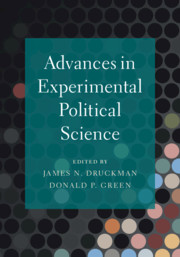Book contents
- Frontmatter
- Contents
- List of Figures
- List of Tables
- List of Boxes
- List of Contributors
- Acknowledgements
- 1 A New Era of Experimental Political Science
- Part I Experimental Designs
- Part II Experimental Data
- Part III Experimental Treatments and Measures
- Part IV Experimental Analys is and Presentation
- Part V Experimental Reliability and Generalizability
- 18 Transparency in Experimental Research
- 19 Threats to the Scientific Credibility of Experiments: Publication Bias and P-Hacking
- 20 What Can Multi-Method Research Add to Experiments?
- 21 Generalizing Experimental Results
- 22 Conducting Experiments in Multiple Contexts
- Part VI Using Experiments to study Identity
- Part VII Using Experiments to Study Government Actions
- Author Index
- Subject Index
21 - Generalizing Experimental Results
from Part V - Experimental Reliability and Generalizability
Published online by Cambridge University Press: 08 March 2021
- Frontmatter
- Contents
- List of Figures
- List of Tables
- List of Boxes
- List of Contributors
- Acknowledgements
- 1 A New Era of Experimental Political Science
- Part I Experimental Designs
- Part II Experimental Data
- Part III Experimental Treatments and Measures
- Part IV Experimental Analys is and Presentation
- Part V Experimental Reliability and Generalizability
- 18 Transparency in Experimental Research
- 19 Threats to the Scientific Credibility of Experiments: Publication Bias and P-Hacking
- 20 What Can Multi-Method Research Add to Experiments?
- 21 Generalizing Experimental Results
- 22 Conducting Experiments in Multiple Contexts
- Part VI Using Experiments to study Identity
- Part VII Using Experiments to Study Government Actions
- Author Index
- Subject Index
Summary
Experiments have come to be a widely accepted and highly regarded method for political science research. Randomization allows for well identified causal effects that are “internally valid” to the experimental setting. However, political scientists are driven by asking big questions with broad impacts, and we are rarely able to conduct the ideal experiment on a representative sample of the target population of interest. This leaves open the question: under what conditions can we make inferences about the effectiveness of treatment for a different population, one upon which we did not conduct our experiment. This problem of “external validity” has seen increased attention in statistics and the broader social sciences as researchers and policy makers wish to know the impact of interventions beyond the experimental sample. This chapter examines the assumptions researchers must make in order to generalize their experimental findings and the implications for how researchers should design experiments if they wish to maximize the generalizability of their findings.
- Type
- Chapter
- Information
- Advances in Experimental Political Science , pp. 385 - 410Publisher: Cambridge University PressPrint publication year: 2021
- 6
- Cited by

